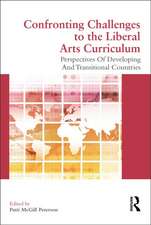Decentralisation, School-Based Management, and Quality: Globalisation, Comparative Education and Policy Research, cartea 8
Editat de Joseph Zajda, David T. Gamageen Limba Engleză Paperback – 14 mar 2012
| Toate formatele și edițiile | Preț | Express |
|---|---|---|
| Paperback (1) | 638.89 lei 6-8 săpt. | |
| SPRINGER NETHERLANDS – 14 mar 2012 | 638.89 lei 6-8 săpt. | |
| Hardback (1) | 645.14 lei 6-8 săpt. | |
| SPRINGER NETHERLANDS – 8 sep 2009 | 645.14 lei 6-8 săpt. |
Din seria Globalisation, Comparative Education and Policy Research
- 24%
 Preț: 731.71 lei
Preț: 731.71 lei - 20%
 Preț: 753.41 lei
Preț: 753.41 lei - 18%
 Preț: 780.57 lei
Preț: 780.57 lei - 15%
 Preț: 643.84 lei
Preț: 643.84 lei - 15%
 Preț: 636.63 lei
Preț: 636.63 lei - 15%
 Preț: 636.80 lei
Preț: 636.80 lei - 15%
 Preț: 637.28 lei
Preț: 637.28 lei - 15%
 Preț: 642.83 lei
Preț: 642.83 lei -
 Preț: 389.11 lei
Preț: 389.11 lei - 15%
 Preț: 643.00 lei
Preț: 643.00 lei - 15%
 Preț: 583.45 lei
Preț: 583.45 lei - 15%
 Preț: 646.62 lei
Preț: 646.62 lei - 24%
 Preț: 694.97 lei
Preț: 694.97 lei - 18%
 Preț: 731.59 lei
Preț: 731.59 lei - 15%
 Preț: 644.82 lei
Preț: 644.82 lei - 18%
 Preț: 939.77 lei
Preț: 939.77 lei - 15%
 Preț: 635.31 lei
Preț: 635.31 lei - 18%
 Preț: 941.82 lei
Preț: 941.82 lei - 18%
 Preț: 994.39 lei
Preț: 994.39 lei - 18%
 Preț: 724.80 lei
Preț: 724.80 lei - 18%
 Preț: 886.43 lei
Preț: 886.43 lei - 18%
 Preț: 887.86 lei
Preț: 887.86 lei - 18%
 Preț: 777.35 lei
Preț: 777.35 lei - 15%
 Preț: 642.51 lei
Preț: 642.51 lei - 18%
 Preț: 781.45 lei
Preț: 781.45 lei - 18%
 Preț: 775.65 lei
Preț: 775.65 lei - 18%
 Preț: 938.66 lei
Preț: 938.66 lei
Preț: 638.89 lei
Preț vechi: 751.64 lei
-15% Nou
Puncte Express: 958
Preț estimativ în valută:
122.25€ • 126.12$ • 102.02£
122.25€ • 126.12$ • 102.02£
Carte tipărită la comandă
Livrare economică 27 martie-10 aprilie
Preluare comenzi: 021 569.72.76
Specificații
ISBN-13: 9789400730397
ISBN-10: 940073039X
Pagini: 264
Ilustrații: XXVI, 238 p.
Dimensiuni: 155 x 235 x 14 mm
Greutate: 0.38 kg
Ediția:2009
Editura: SPRINGER NETHERLANDS
Colecția Springer
Seria Globalisation, Comparative Education and Policy Research
Locul publicării:Dordrecht, Netherlands
ISBN-10: 940073039X
Pagini: 264
Ilustrații: XXVI, 238 p.
Dimensiuni: 155 x 235 x 14 mm
Greutate: 0.38 kg
Ediția:2009
Editura: SPRINGER NETHERLANDS
Colecția Springer
Seria Globalisation, Comparative Education and Policy Research
Locul publicării:Dordrecht, Netherlands
Public țintă
ResearchCuprins
Main Trends and Issues in Decentralisation, School-Based Management.- Decentralisation and School-Based Governance: A Comparative Study of Self-Governing School Models.- Globalized Educational Governance, Decentralization and Grassroots Responses.- Centralisation and Decentralisation in Education: A New Dimension to Policy.- Unresolved Issues in Globalisation, Decentralisation and Privatisation.- Decentralisation and Market Mechanisms in Education – Examples from Six European Countries.- Managing School Change: Continuous Improvement Based on a Shared Vision and a Strategic Plan.- Case Studies.- Decentralisation of Education: Promising Initiative or Problematic Notion?.- Decentralising Indonesian Education: The Promise and the Price.- Decentralisation in Senegal – Ambiguous Agendas for Community Education.- Decentralisation and Education in Africa: The Case of Uganda.- State and Parental Roles in the Decentralised Education System in Nicaragua.- Teachers’ Empowerment and Commitment at School-Based and Non-School-Based Sites.
Textul de pe ultima copertă
The relationship between government, education reform and student outcomes is an ambivalent and often problematic one. Focusing on the interplay between decentralization, globalization, and education reforms, this book draws on recent studies to explore the conceptual frameworks and methodological approaches that can be applied to research covering the state, globalization, equality, and education. It lays bare the neo-liberal ideological imperatives of education and policy reforms, and illustrates the way the relationship between the state and education policy affects current models and trends in education reforms and schooling globally.
The chapters critically analyze the dominant discourses about decentralization and comparative education and examine the current resurgence of neo-liberal ideological models in education, both newly constructed and re-invented. To ensure as broad a perspective on the issues as possible, the authors employ a raft of diverse paradigms in comparative education research, ranging from critical theory to globalization.
This in-depth exploration of globalization, ideology and democracy in education examines both the reasons for and outcomes of education reforms, decentralization, policy change and transformation. In doing so, it seeks to provide a more informed critique on Western-driven models of accountability, quality and school effectiveness. It is the eighth in the 12-volume book series Globalization, Comparative Education and Policy Research, which presents scholarly research on major discourses in comparative education research with reference to decentralization and school-based management. The series provides an accessible, practical yet scholarly source of information about international issues in the field of globalization and comparative education.
The chapters critically analyze the dominant discourses about decentralization and comparative education and examine the current resurgence of neo-liberal ideological models in education, both newly constructed and re-invented. To ensure as broad a perspective on the issues as possible, the authors employ a raft of diverse paradigms in comparative education research, ranging from critical theory to globalization.
This in-depth exploration of globalization, ideology and democracy in education examines both the reasons for and outcomes of education reforms, decentralization, policy change and transformation. In doing so, it seeks to provide a more informed critique on Western-driven models of accountability, quality and school effectiveness. It is the eighth in the 12-volume book series Globalization, Comparative Education and Policy Research, which presents scholarly research on major discourses in comparative education research with reference to decentralization and school-based management. The series provides an accessible, practical yet scholarly source of information about international issues in the field of globalization and comparative education.
Caracteristici
Explores conceptual frameworks and methodological approaches applicable in the research of decentralisation, globalisation, school-based management, and education reforms Examines central discourses surrounding the debate of decentralisation, access and equity in schooling globally Illustrates how the relationship between decentralization, globalisation, democracy and education policy affects current models and trends in schooling globally Demonstrates ideological imperatives of globalisation and its impact on trends in decentralization, democracy and equality Evaluates the ambivalent and problematic relationship between the State, decentralisation, education reforms and outcomes in education globally















